"I will never consent to the pardon of this man . . ."
--WOODROW WILSON
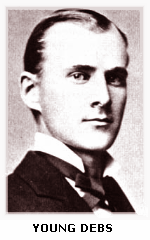 Eugene Victor Debs, a grocer's son from Terre Haute, Indiana, worked on the railroad in his teens. He became secretary-treasurer of the Brotherhood of Locomotive Firemen a few years later but quit to set up the American Railway Union because he believed in industrial organization. A strike he staged in 1894 stopped James J. Hill from cutting the starvation wages on the Great Northern. Then Debs crippled freight and passenger service west of Chicago by calling his men
Eugene Victor Debs, a grocer's son from Terre Haute, Indiana, worked on the railroad in his teens. He became secretary-treasurer of the Brotherhood of Locomotive Firemen a few years later but quit to set up the American Railway Union because he believed in industrial organization. A strike he staged in 1894 stopped James J. Hill from cutting the starvation wages on the Great Northern. Then Debs crippled freight and passenger service west of Chicago by calling his men 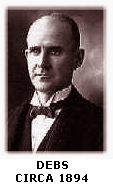 out in sympathy with Pullman Company strikers who were fighting a 25 percent pay cut. Federal troops clashed with the strikers and thirty men died. Debs did time in jail for violating an injunction George Pullman got out against the union. The strike was crushed and the union folded and Gene Debs turned to Socialism. He was the party's candidate for President in 1912 and drew 901,872 votes against 6,286,214 for Woodrow Wilson,
4,216,020 for Theodore Roosevelt (Progressive) and 3,483,922 for William Howard Taft.
out in sympathy with Pullman Company strikers who were fighting a 25 percent pay cut. Federal troops clashed with the strikers and thirty men died. Debs did time in jail for violating an injunction George Pullman got out against the union. The strike was crushed and the union folded and Gene Debs turned to Socialism. He was the party's candidate for President in 1912 and drew 901,872 votes against 6,286,214 for Woodrow Wilson,
4,216,020 for Theodore Roosevelt (Progressive) and 3,483,922 for William Howard Taft.
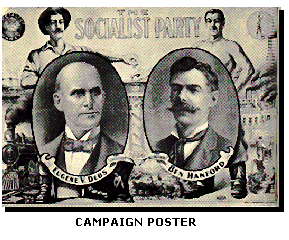 When the war came, Debs opposed it fiercely. The Espionage Act, meant to silence all anti-war sentiment, merely added fire to his spirit. He mounted one public rostrum after another and denounced "the master class" and "the junkers of Wall Street." He defied arrest. "I would a thousand times rather be a free soul in jail than to be a sycophant and coward in the streets," he said. The government obliged him in 1918. He was tried in Cleveland in September. When Prosecutor F.B. Kavanagh completed his case, Debs congratulated him on his oratory
When the war came, Debs opposed it fiercely. The Espionage Act, meant to silence all anti-war sentiment, merely added fire to his spirit. He mounted one public rostrum after another and denounced "the master class" and "the junkers of Wall Street." He defied arrest. "I would a thousand times rather be a free soul in jail than to be a sycophant and coward in the streets," he said. The government obliged him in 1918. He was tried in Cleveland in September. When Prosecutor F.B. Kavanagh completed his case, Debs congratulated him on his oratory
 and said he had no defense witnesses but would address the jury himself. He started by saying that he would not deny any of the utterances ascribed to him and deemed subversive by Uncle Sam.
and said he had no defense witnesses but would address the jury himself. He started by saying that he would not deny any of the utterances ascribed to him and deemed subversive by Uncle Sam.
"I admit being opposed to the present form of government," Debs told the solid citizens sitting in judgment upon him. "I admit being opposed to the present social system. I am doing what little I can to do away with the rule of the great body of people by a relatively small class and establish in this country industrial and social democracy . . . You may hasten the change; you may retard it; you can do no more to prevent it than you can prevent the coming of the sunrise on the morrow."
The verdict, of course, was guilty.
Debs addressed the court before sentence:
"Your Honor, years ago I recognized my kinship with all living things and I made up my mind that I was not one bit better than the meanest of the earth. I said then, I say now, that while there is a lower class I am in it; while there is a criminal element, I am of it; while there is a soul in prison, I am not free."
The sentence was ten years.
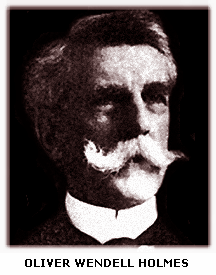 When Debs came out of the courtroom a little girl rushed up to him with some American Beauty roses--his favorite flower--and then fainted. Debs carried the child into an ante-room and stayed until she revived.
When Debs came out of the courtroom a little girl rushed up to him with some American Beauty roses--his favorite flower--and then fainted. Debs carried the child into an ante-room and stayed until she revived.
The war ended before the Supreme Court acted on the Socialist leader's appeal--Justice Oliver Wendell Holmes wrote the opinion denying Debs' contention that the Espionage Act violated freedom of speech--and Debs went behind bars. He couldn't be put in a federal lockup, because Attorney General Palmer
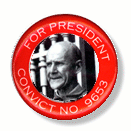 had them chock full of enemies of the Republic, so he was sent to the State Penitentiary at�Moundsville, West Virginia. It was April, 1919.
had them chock full of enemies of the Republic, so he was sent to the State Penitentiary at�Moundsville, West Virginia. It was April, 1919.
"I enter the prison doors a flaming revolutionist--my head erect, my spirit untamed, and my soul unconquerable," the eloquent Socialist said 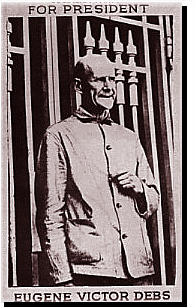 at the gates. He was 64, tall, gaunt, worn by struggle, tortured by lumbago. In June they found room for him in the federal prison at Atlanta and there in May, 1920, a delegation called on Number 9653 to notify him that his party again had nominated him for President. In what passed for a campaign, he was permitted to issue one bulletin a week to the news services. In that handcuffed posture, he drew 915,490 votes, 13,618 more than his 1912 total but proportionately well below it, for Warren Harding won with 16,153,115 votes and the Democratic candidate, James M. Cox, polled 9,133,092.
at the gates. He was 64, tall, gaunt, worn by struggle, tortured by lumbago. In June they found room for him in the federal prison at Atlanta and there in May, 1920, a delegation called on Number 9653 to notify him that his party again had nominated him for President. In what passed for a campaign, he was permitted to issue one bulletin a week to the news services. In that handcuffed posture, he drew 915,490 votes, 13,618 more than his 1912 total but proportionately well below it, for Warren Harding won with 16,153,115 votes and the Democratic candidate, James M. Cox, polled 9,133,092.
Palmer urged Woodrow Wilson to free Debs on Lincoln's Birthday in 1921. "Denied," Wilson wrote over the recommendation. "I will never consent to the pardon of this man," the ailing President told his secretary, Joseph P. Tumulty. "While the flower of American youth was pouring out its blood to vindicate the cause of civilization,
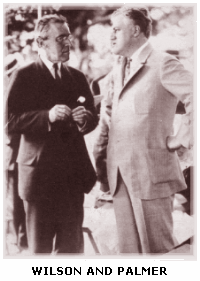 this man Debs stood behind the lines, sniping, attacking and denouncing them . . . I know there will be a great deal of denunciation of me for refusing this pardon. They will say I am cold-blooded and indifferent, but it will make no impression on me. This man was a traitor to his country and he will never be pardoned during my Administration."
this man Debs stood behind the lines, sniping, attacking and denouncing them . . . I know there will be a great deal of denunciation of me for refusing this pardon. They will say I am cold-blooded and indifferent, but it will make no impression on me. This man was a traitor to his country and he will never be pardoned during my Administration."
This was two years and two months after the war. The old fighter in Atlanta, who wouldn't ask for clemency himself, turned an equally bitter tongue on the outgoing President.
"It is he, not I, who needs a pardon," said No. 9653. "If I had it in my power I would give him the pardon which would set him free. Woodrow Wilson is an exile from the hearts of his people . . . the most pathetic figure in the world. No man in public life in American history ever retired so thoroughly discredited, so scathingly rebuked, so overwhelmingly impeached and repudiated as Woodrow Wilson."
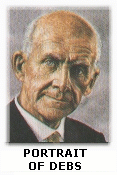 Warren Harding committed himself to a general amnesty during the campaign and soon after he took office, in March, Attorney General Daugherty sent for Debs, presumably to see for himself whether American institutions might perish if the sick old man were let out. Debs came alone from Atlanta, on his honor, and impressed Daugherty as a safe risk. Come Christmas Day, Harding let him out, asking him to drop by the White House. "I have heard so damned much about you, Mr. Debs," the President said, "that I am very glad to meet you personally."
Warren Harding committed himself to a general amnesty during the campaign and soon after he took office, in March, Attorney General Daugherty sent for Debs, presumably to see for himself whether American institutions might perish if the sick old man were let out. Debs came alone from Atlanta, on his honor, and impressed Daugherty as a safe risk. Come Christmas Day, Harding let him out, asking him to drop by the White House. "I have heard so damned much about you, Mr. Debs," the President said, "that I am very glad to meet you personally."
Then Debs went home to Terre Haute to his wife, Kate.
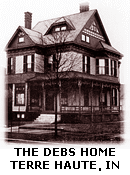 He lingered five years. He died on October 20, 1926. Someone recalled a line from the speech in Canton, Ohio, that led to his indictment: ". . . they cannot put the Socialist movement in jail."
He lingered five years. He died on October 20, 1926. Someone recalled a line from the speech in Canton, Ohio, that led to his indictment: ". . . they cannot put the Socialist movement in jail."
It turned out to be true.
The Congress of the United States down through the years has passed all kinds of laws but it never passed one that succeeded in putting an idea--good or bad--behind bars. That was Gene Debs' point. He put his life on the line for it.



 Eugene Victor Debs, a grocer's son from Terre Haute, Indiana, worked on the railroad in his teens. He became secretary-treasurer of the Brotherhood of Locomotive Firemen a few years later but quit to set up the American Railway Union because he believed in industrial organization. A strike he staged in 1894 stopped James J. Hill from cutting the starvation wages on the Great Northern. Then Debs crippled freight and passenger service west of Chicago by calling his men
Eugene Victor Debs, a grocer's son from Terre Haute, Indiana, worked on the railroad in his teens. He became secretary-treasurer of the Brotherhood of Locomotive Firemen a few years later but quit to set up the American Railway Union because he believed in industrial organization. A strike he staged in 1894 stopped James J. Hill from cutting the starvation wages on the Great Northern. Then Debs crippled freight and passenger service west of Chicago by calling his men  out in sympathy with Pullman Company strikers who were fighting a 25 percent pay cut. Federal troops clashed with the strikers and thirty men died. Debs did time in jail for violating an injunction George Pullman got out against the union. The strike was crushed and the union folded and Gene Debs turned to Socialism. He was the party's candidate for President in 1912 and drew 901,872 votes against 6,286,214 for Woodrow Wilson,
4,216,020 for Theodore Roosevelt (Progressive) and 3,483,922 for William Howard Taft.
out in sympathy with Pullman Company strikers who were fighting a 25 percent pay cut. Federal troops clashed with the strikers and thirty men died. Debs did time in jail for violating an injunction George Pullman got out against the union. The strike was crushed and the union folded and Gene Debs turned to Socialism. He was the party's candidate for President in 1912 and drew 901,872 votes against 6,286,214 for Woodrow Wilson,
4,216,020 for Theodore Roosevelt (Progressive) and 3,483,922 for William Howard Taft. When the war came, Debs opposed it fiercely. The Espionage Act, meant to silence all anti-war sentiment, merely added fire to his spirit. He mounted one public rostrum after another and denounced "the master class" and "the junkers of Wall Street." He defied arrest. "I would a thousand times rather be a free soul in jail than to be a sycophant and coward in the streets," he said. The government obliged him in 1918. He was tried in Cleveland in September. When Prosecutor F.B. Kavanagh completed his case, Debs congratulated him on his oratory
When the war came, Debs opposed it fiercely. The Espionage Act, meant to silence all anti-war sentiment, merely added fire to his spirit. He mounted one public rostrum after another and denounced "the master class" and "the junkers of Wall Street." He defied arrest. "I would a thousand times rather be a free soul in jail than to be a sycophant and coward in the streets," he said. The government obliged him in 1918. He was tried in Cleveland in September. When Prosecutor F.B. Kavanagh completed his case, Debs congratulated him on his oratory
 and said he had no defense witnesses but would address the jury himself. He started by saying that he would not deny any of the utterances ascribed to him and deemed subversive by Uncle Sam.
and said he had no defense witnesses but would address the jury himself. He started by saying that he would not deny any of the utterances ascribed to him and deemed subversive by Uncle Sam. When Debs came out of the courtroom a little girl rushed up to him with some American Beauty roses--his favorite flower--and then fainted. Debs carried the child into an ante-room and stayed until she revived.
When Debs came out of the courtroom a little girl rushed up to him with some American Beauty roses--his favorite flower--and then fainted. Debs carried the child into an ante-room and stayed until she revived. had them chock full of enemies of the Republic, so he was sent to the State Penitentiary at�Moundsville, West Virginia. It was April, 1919.
had them chock full of enemies of the Republic, so he was sent to the State Penitentiary at�Moundsville, West Virginia. It was April, 1919. at the gates. He was 64, tall, gaunt, worn by struggle, tortured by lumbago. In June they found room for him in the federal prison at Atlanta and there in May, 1920, a delegation called on Number 9653 to notify him that his party again had nominated him for President. In what passed for a campaign, he was permitted to issue one bulletin a week to the news services. In that handcuffed posture, he drew 915,490 votes, 13,618 more than his 1912 total but proportionately well below it, for Warren Harding won with 16,153,115 votes and the Democratic candidate, James M. Cox, polled 9,133,092.
at the gates. He was 64, tall, gaunt, worn by struggle, tortured by lumbago. In June they found room for him in the federal prison at Atlanta and there in May, 1920, a delegation called on Number 9653 to notify him that his party again had nominated him for President. In what passed for a campaign, he was permitted to issue one bulletin a week to the news services. In that handcuffed posture, he drew 915,490 votes, 13,618 more than his 1912 total but proportionately well below it, for Warren Harding won with 16,153,115 votes and the Democratic candidate, James M. Cox, polled 9,133,092. this man Debs stood behind the lines, sniping, attacking and denouncing them . . . I know there will be a great deal of denunciation of me for refusing this pardon. They will say I am cold-blooded and indifferent, but it will make no impression on me. This man was a traitor to his country and he will never be pardoned during my Administration."
this man Debs stood behind the lines, sniping, attacking and denouncing them . . . I know there will be a great deal of denunciation of me for refusing this pardon. They will say I am cold-blooded and indifferent, but it will make no impression on me. This man was a traitor to his country and he will never be pardoned during my Administration." Warren Harding committed himself to a general amnesty during the campaign and soon after he took office, in March, Attorney General Daugherty sent for Debs, presumably to see for himself whether American institutions might perish if the sick old man were let out. Debs came alone from Atlanta, on his honor, and impressed Daugherty as a safe risk. Come Christmas Day, Harding let him out, asking him to drop by the White House. "I have heard so damned much about you, Mr. Debs," the President said, "that I am very glad to meet you personally."
Warren Harding committed himself to a general amnesty during the campaign and soon after he took office, in March, Attorney General Daugherty sent for Debs, presumably to see for himself whether American institutions might perish if the sick old man were let out. Debs came alone from Atlanta, on his honor, and impressed Daugherty as a safe risk. Come Christmas Day, Harding let him out, asking him to drop by the White House. "I have heard so damned much about you, Mr. Debs," the President said, "that I am very glad to meet you personally." He lingered five years. He died on October 20, 1926. Someone recalled a line from the speech in Canton, Ohio, that led to his indictment: ". . . they cannot put the Socialist movement in jail."
He lingered five years. He died on October 20, 1926. Someone recalled a line from the speech in Canton, Ohio, that led to his indictment: ". . . they cannot put the Socialist movement in jail."